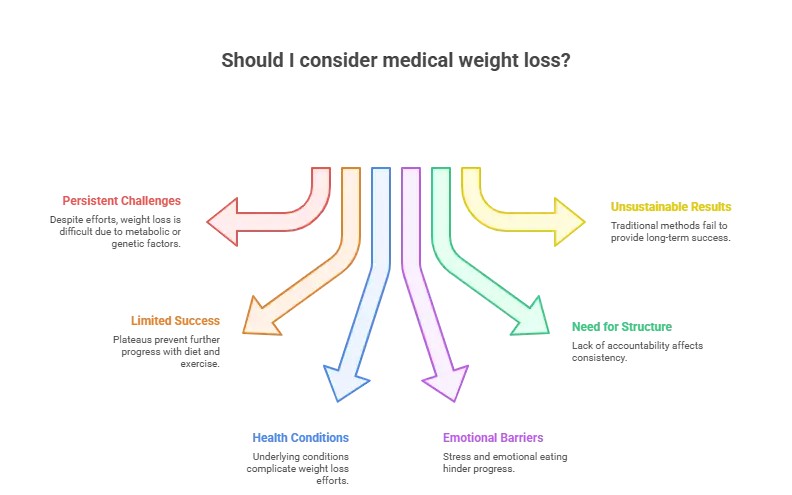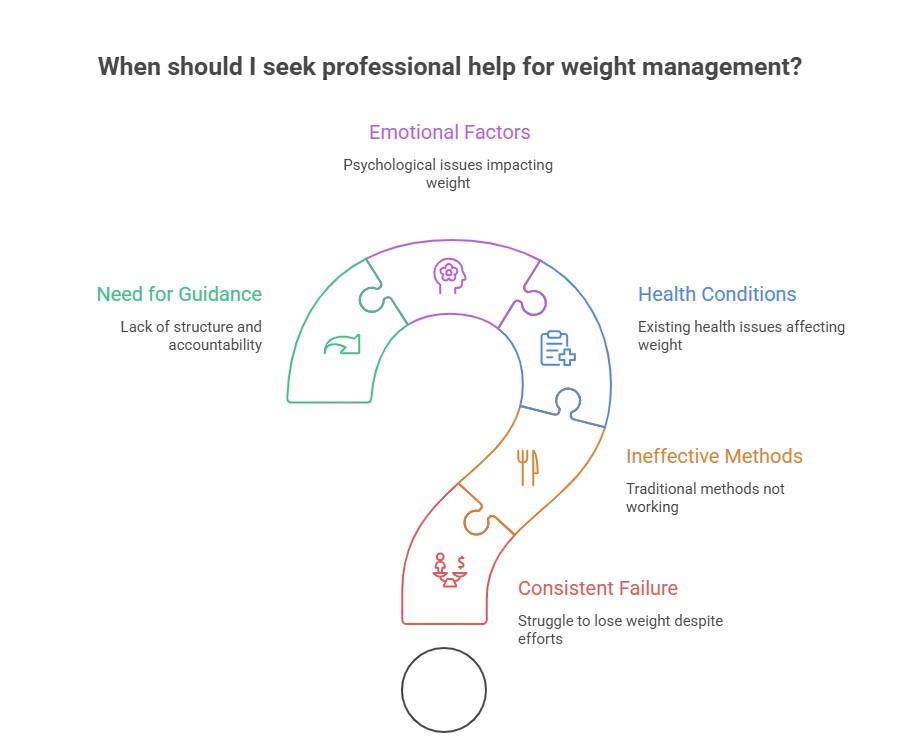


For many individuals, losing weight can be a significant challenge, even with dedication to diet and exercise. If you have been consistently struggling to achieve your weight loss goals, medical weight loss programs may provide a structured, safe, and effective solution. Unlike conventional approaches, these programs offer personalized weight loss plans guided by healthcare professionals, ensuring a sustainable path to better health. Recognizing when professional assistance is appropriate is essential.
Let’s identify the key indicators that signal it’s time to seek professional help, guiding individuals toward medical intervention for long-term success and improved overall well-being.
Medical weight loss treatment is a comprehensive approach that integrates nutrition, exercise, and medical supervision to support safe and effective weight management. Programs are typically overseen by healthcare professionals, ensuring that strategies are tailored to individual needs.
Unlike generic dieting or self-directed weight loss methods, medical weight loss addresses underlying factors such as metabolism, hormonal imbalances, and genetic predispositions, providing a structured plan to achieve measurable results.
If you have consistently struggled to lose weight despite sustained effort, professional guidance may be beneficial. Metabolic factors, hormonal imbalances, or genetics can make traditional methods less effective, highlighting the need for a more personalized approach. Treatments like semaglutide for weight loss may offer additional support when traditional methods fall short.
While consistency in diet and physical activity is important, some individuals encounter plateaus that prevent further progress. Medical weight loss programs offer tailored strategies designed to address these challenges and support continued progress.
Certain medical conditions, such as diabetes, hypothyroidism, polycystic ovary syndrome (PCOS), sleep apnea, or hypertension, especially when you may be experiencing early warning signs, can complicate weight loss efforts. Medical programs incorporate these considerations into the weight loss plan, which may include specialized dietary adjustments or medications.
Stress, emotional eating, and other psychological factors can impede weight management. Comprehensive medical weight loss programs often include counseling, behavioral therapy, or support groups to address both the physical and emotional components of weight loss.
Self-directed weight loss can lack the structure necessary for consistent results. Medical programs provide regular check-ins, progress monitoring, and plan adjustments to maintain accountability and ensure continued improvement.
Fad diets or intensive exercise routines may offer temporary results but often fail to produce long-term success. Medical weight loss solutions employ evidence-based strategies, personalized to the individual, enhancing the likelihood of sustainable outcomes.

Medical weight loss programs provide a structured, personalized approach that supports overall health and long-term success. Key benefits include:
Consultation with a qualified weight loss healthcare provider is essential before beginning a medical weight loss program.
This process typically involves:
Consider consulting a healthcare professional if:
Early professional support can improve the safety, effectiveness, and sustainability of your weight loss journey.

Medical weight loss offers a structured, supervised approach for individuals struggling to lose weight through traditional methods. Programs provide personalized plans, medical oversight, and strategies that address underlying health, emotional, and lifestyle factors. Recognizing the signs that indicate professional help is needed, such as long-term weight challenges, health conditions, or repeated plateaus, can guide individuals toward sustainable, effective results and improved overall well-being.
Metro Urgent Care offers personalized medical weight loss programs designed to address your unique needs. Our healthcare professionals provide guidance, monitor progress, and create structured plans that combine nutrition, exercise, and medical support for safe, sustainable results.
Get started on your path, contact us today and start a smarter, healthier weight loss journey.
Programs vary based on individual goals and health needs, but most last several months with regular check-ins, adjustments, and ongoing medical supervision for sustainable results.
These programs are tailored and supervised by healthcare professionals, ensuring safety while addressing underlying health conditions like diabetes, hypertension, or thyroid disorders.
Depending on individual needs, medically approved weight loss medications may be prescribed alongside nutrition, exercise, and lifestyle strategies for better results.
Programs provide personalized nutrition plans designed by professionals to complement exercise routines and medical strategies for safe, effective weight management.
Follow-ups typically occur every few weeks or monthly, depending on individual progress, to monitor results, adjust plans, and maintain accountability for long-term success.